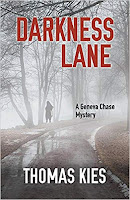By Vicki Delany
I'm delighted to invite my good friend, fellow festival organizer, and excellent writer Janet Kellough back to Type M. I'm certainly keen to find out what Thaddeus Lewis is getting up to now.
One of the things
that is lovely about writing a series is the way the characters evolve as time
goes on. In the first book in my Thaddeus
Lewis mystery series, On the Head of
a Pin, the hero/detective Lewis is a
man in his prime struggling with the unexpected death of his daughter, a loss
that propels him headlong into a murder investigation. He is decisive and
forthright and resolute, certain in his calling as a saddlebag preacher. But in
his pursuit of the killer, he comes to understand that the world is perhaps not
quite as black and white as he’d always believed.
As his story
progressed through the subsequent books, he loosened up even more. He softened.
He began to doubt himself. And the meaner I was to him, the more relatable he became.
And I’ve been pretty nasty - I’ve bashed him over the head and broken his arm.
I gave him a gimpy knee. I pointed a gun at him a few times. I killed his wife.
I humiliated him. I seduced him. (Big existential crisis for a 19th
century minister.)
But with each challenge,
his character deepened and I liked him more.
His family grew up
around him as the story went on. Relationships subtly shifted. And then friend
and foe alike began to wander through the narrative, popping up here and there
just when the plot needed them most.
Now, in the
seventh book The Untoward Assassin Thaddeus’s
granddaughter Martha, who was a toddler in the first book, is nearly an adult
and about to embark on a career as a teacher, thanks to the fact that the
Provincial Normal School, the teachers’ college of the day, actually accepted
female students – a provision virtually unheard of at institutions of higher
learning in 1855.
Thaddeus
accompanies her to Toronto, and lo and behold, there’s his youngest son Luke,
sitting there ready to be called back into the story. But the dynamic between Luke
and his father has changed from the earlier books. Luke has gone from being an
insecure student with a big secret to a successful physician (he still has a
big secret, but he’s not as bothered by it.) He is very worried about his
father’s health. Both he and his brothers are worried about what Thaddeus is
going to do with himself now that he’s given up preaching. The question “What
are we going to do about Thaddeus?” becomes a recurrent refrain as the plot
unfolds. Each of the Lewis sons is willing to look after their father if
necessary, but each of them will be relieved if one of the others offers first.
Thaddeus is no longer the patriarch to whom everyone turns. The old man has become
a problem.
But in the way of
many children, they’ve underestimated him. He’s still a magnet for trouble and
he’s still quite capable of meeting it head on.
When he becomes
convinced that someone is trying to kill him. Luke dismisses the notion at
first. (Oh no! Is Thaddeus becoming senile?) Martha believes him – but where
once she would have believed simply because he’s Thaddeus and for most of her
childhood she was a little confused about whether or not he and God were
actually the same person - she now weighs the evidence and comes to her own
conclusion. Eventually everyone agrees that something is going on and that the
would-be assassin must be connected somehow to one of the crimes that Thaddeus
previously investigated.
And guess what?
There were any number of ready-made suspects lurking in the background just
waiting for a reprise. I had my choice of instant villains, already conveniently
supplied with motive, their characters established and ready to go.
Any writer of
fiction creates a setting through which the characters move, but a series
allows the context to shift and grow in surprising ways. Past events impact the
storyline in odd ways. Characters can make an appearance in one book and
suddenly pop up again several books later. Sometimes they grumble until you let
them out. Sometimes they show up and run away with the plot. And sometimes both
the setting and the characters change and grow in directions that you couldn’t
have conceived of in the beginning.
“But what happens
next?” Thaddeus Lewis fans ask. The answer is, “I don’t know. I’m waiting or
the characters to tell me.”
Sometimes I’m not
sure it’s even me writing this stuff anymore.
Janet Kellough is the author of The
Thaddeus Lewis mysteries, the adventures of a 19th century saddlebag
preacher. She has also written two contemporary novels The Palace of the Moon and The
Pear Shaped Woman, the speculative fiction work The Bathwater Conspiracy, and the semi-non-fictional Legendary Guide to Prince Edward County.
She is also a co-founder of Women Killing
It Crime Writers’ Festival, which
showcases crime fiction by female authors.

















